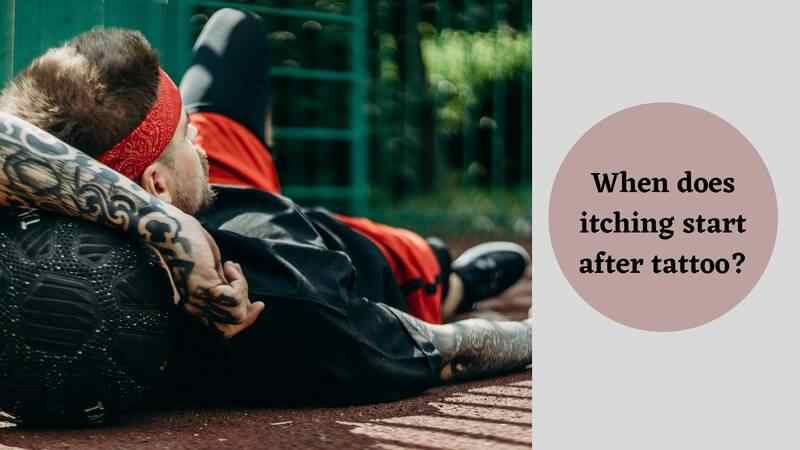You are surely not alone if you have started itching your tattoo. When does itching start after tattoo is an ever-rising question that is prevailing among individuals?
Tattoos are extremely prone to itchiness when it is fresh. However, it occurs almost in every healing stage. The skin gets damaged due to the ink and needles, leading to the itchiness when you start getting a new tattoo.
Irrespective of what causes it, you should never be scratching the tattoo, mainly if it is crafted with new ink that is undergoing healing. It leads to some serious damage to the tattoo around the skin surrounding it.
Our post can help you in learning more about several causes leading to the itchiness of tattoos and how you can treat them without having the urge to scratch them!
Contents
When Does Itching Start After Tattoo?

By the first or second week, your new tattoo will probably start to itch and flake.
How normal is it for the tattoo to itch?
It is a normal experience of mild itchiness once you get a tattoo. A tattoo mainly involves breaking down the skin of the body that has to be repaired for the wound in the similar way as it would for the scratches and cuts. Itching often occurs while the skin is already healing.
Individuals should be attentive for the initial few days and even weeks after getting a new tattoo done for making sure the proper healing process. If the itchiness worsens associated with any other symptoms, then it can be the probable sign of some other issues.
Read– What is a Hairline Fracture?
What causes an itchy tattoo?

Itchiness is extremely common with new tattoos; however, it happens even with old tattoos. The itchy tattoo is attributed to about one or more of the following sources:
Normal healing process
Your skin will be recovering from a wound as you get on with a new tattoo. The skin swells up, working to prevent any type of infection and repairing by itself. As the tissues of your skin heal, it becomes normal in terms of experiencing a bit of itchiness.
Infection
A new tattoo is prone to expose the deeper layers of the epidermis along with the dermis of the skin tissues. The new ink is extremely vulnerable to becoming infected within just a couple of weeks during this healing process.
Itchiness is extremely common and is associated with redness, swelling along with discharges if the area becomes infected. There are serious infections that cause chills along with fever. The infection is likely to be warranting a visit to your doctor.
Pigmentation & Allergic Reactions
Some people are allergic to the ink being used in tattooing. Tattoo tints may be created using dyes derived from plastic components. An allergic response might happen immediately away or several years after you have your tattoo, according to with American Academy of Dermatology (AAD). As a result, you may have intense itching, as well as redness and hive-like lumps.
Contamination of ink
Aside from allergic responses to tattoo ink, it’s also possible to have symptoms from tainted tattoo ink. On the derivations to the US Food and Drug Administration, even if the ink is labeled “sterile,” you might be in danger (FDA).
Preexisting skin conditions
You might not be the greatest choice for a tattoo if you have a skin problem like eczema or psoriasis. It is conceivable, though, to experience a flare-up after you’ve already had a tattoo. This can result in red, irritated blotches of skin wherever on your body, including tattooed areas. When you have psoriasis, learn as much about tattoo safety.
Sarcoidosis
Sarcoidosis is a disease that can lead to the removal of previous tattoos. According to AAD, an autoimmune disorder can develop decades later and potentially impact internal organs. While sarcoidosis is not directly linked to tattoo ink, it is known to produce severe itching and swelling in old tattoos.
MRI reactions
There are professionals who may suggest magnetic resonance imaging or MRI scans for screening a few specific health conditions. Although they are rare, there are sources that have reported that MRI scans affect older tattoos. The symptoms likely include itchiness and inflammations.
Eczema
Eczema is a skin ailment that causes the skin to become inflamed, red, itchy, and cracked. Allergies, dryness, and irritants like perfumes can all cause eczema.
Eczema is not always triggered by tattoos. However, eczema might flare up days or even seasons back in the tattooed region.
Before getting a tattoo, those with eczema should consult a doctor. They should also inquire about sensitive skin inks with the tattoo artist. Aftercare recommendations and a solution for use while healing should be provided by the tattoo studio.
If there is developing eczema on or around the new tattoo, then it is important to ask your tattoo artist in terms of moisturizing that will not be interfering with the new inks. Make sure that you are avoiding the products with alcohol and fragrances that can make eczema worsen.
Psoriasis
The immune system assaults healthy skin cells in psoriasis, which is an autoimmune condition. Skin cells regenerate excessively fast as a result of this, resulting in red, scaly spots on the skin. Psoriasis scales are usually itchy and unpleasant.
Skin damage is one of the most well-known psoriasis causes. According to the National Psoriasis Foundation, even minor traumas, such as a vaccination needle prick, can cause psoriasis in some people.
Because a tattoo involves piercing the skin with a needle, it may cause psoriasis to occur for the very first time.
People with psoriasis complaints who have tattooing should visit a doctor. Topical lotions and other drugs can be used to treat psoriasis.
Skin cancer
It is vital to remember that there is nothing that would suggest a direct connection between skin cancer and tattoo. But, there is always the likelihood that an itchy tattoo leading to skin cancer is less possibility.
But, skin cancer can happen anywhere across the skin, including areas having tattoos, and one of the commonest symptoms of skin cancer is the reddish and itchy patch on the skin.
If there is a person notices the itchiness with alterations to the skin along with the tattooed area, they should visit their doctor for a check on skin cancer if there is something eliminating the possible causes for the itchy tattoo.
Read– Weight Gain After Surgery
How to treat an itchy tattoo?

The proper treatment for an itchy tattoo depends completely on the underlying causes. There are new tattoos that are extremely prone to infections and damage; therefore, extreme care is a must that does not mess up the ink or its surrounding skin. The older ones also possess risks of damaging the skin in a few cases.
OTC creams and ointments
As a general rule, you shouldn’t use over-the-counter (OTC) lotions or ointments on new tattoos since they might obstruct your skin’s natural healing process. However, you can use topical hydrocortisone to treat an itchy, older tattoo.
Cool compresses
Cool compresses can relieve itching and reduce swelling. Before applying any compresses to your tattoos, see your doctor. As per The Nemours Foundation, fresh tattoos might take up to two weeks to heal.
Moisturize the area
If the skin is indeed itchy and dry, moisturizing may be the answer. Choose an oatmeal-based ointment or a heavier moisturizer derived from cocoa butter for old tattoos. Avoid products with colors or perfumes since they may irritate the skin further and unwittingly worsen the itch.
If you have a fresh tattoo, talk to your designer about how to keep it hydrated. On the assumption that some moisturizers or chemicals might draw away fresh ink, some tattoo artists advise avoiding them. An aroma, plain hand lotion is usually recommended.
Oatmeal bath
To soothe your itchy skin, the colloidal oatmeal baths can offer you a soothing relief that includes your older tattoos. But, you should never be using this method for the latest tattoos as you should not be submerging them in water for about a couple of weeks.
Medications
If your tattoo itches due to a prior skin problem, your doctor may suggest antibiotic ointments. Eczema, redness, and psoriasis are examples of this. If you’ve been diagnosed with sarcoidosis, you’ll really have to take medications or supplements to avoid itching and future immune system issues.
Getting rid of old ink
Regrettably, if the ink is the source of your itchy tattoo, you won’t be able to remove it. Professional tattoo removal will need a visit to a dermatologist. Laser treatments or any other chemical peels such as dermabrasion are commonly used. It’s possible that you’ll have a scar for the rest of your life. Darker pigments are often harder to remove.
Consider tattoo removal
If everything else fails and your body has started to react to the latest artwork, then it is better to consider having the ink drawn out if others fail.
Always be sure to check with your dermatologist or any other professional for tattoo removal is a time-consuming process involving laser treatments and dermabrasions at times. There are individuals who may even end up with permanent scarrings.
When should you visit your doctor?
There are various causes for the itchy tattoo, but several of them can be treated. Above the rest, you should resist the urge to scratch it. However, things will worsen, leading to the distorting tattoo.
If you think that there is an infection, then it is extremely crucial to take the suggestion of your doctor. Never should you delay while you are undergoing the chills, fever, along with a feeling of being unwell. Your physicians should be prescribing antibiotics for helping in treating infections along with preventing them from spreading out. These infections also lead to the scarring of the tattoo, although it leads to some serious complications.
Read– Is Tattoo Removal Painful?
FAQs
Below we share some FAQs related to the query “When does itching start after tattoo”
1〉 Does it signify your tattoo is healing if it itches?
Your skin is physically healing from a wound when you receive a new tattoo. The skin is irritated and attempting to avoid infection while also attempting to mend itself. It’s typical to suffer some irritation while the skin tissues repair.
2〉 When did people start scratching their tattoos?
Itching is often a common side effect of the recovery period; it usually begins around day four, when the skin begins to peel and lasts for two weeks. Your tattoo might be infected if itching is joined by swelling, discomfort, spots, or heat that is growing worse rather than better.
3〉 Does it make sense for tattooing to itch?
-As your tattoo heals, it may become scabby and itchy. It is critical not to pick, scrape, or peel your tattoo! If you do, the scab will peel, and the ink will be pulled out, presenting your tattoo with scars and missing ink. If your tattoo itches, softly slap it or use an ice pack to soothe it.
4〉 Do scabs from tattoos peel off by themselves?
The scabs should’ve just entirely gone off, and thin layers of the skin should have developed over the tattoo after around 3 weeks. This epidermis is known as silver skin,’ and it gives the tattoo a gleaming, dull appearance. Once in a while, the brilliance will return.
5〉 After a week, may I scratch my tattoo?
If you think about when you may scratch your new tattoo, the answer is that you shouldn’t do so until it’s fully healed. It will take a bit of time for your skin to recuperate after getting a fresh tattoo.
6〉 How frequently should a fresh tattoo be moisturized?
To avoid cracking and bleeding, keep the new ink damp. So, when it comes to moisturizing your new tattoo, how frequently should you do it? It is advised that you moisturize your tattoo 2-3 times each day or every 8 to 12 hours.
7〉 What is the average time it takes for a tattoo fully heal?
The visible covering of skin (the area you see) usually heals in 2 to 3 weeks after receiving a tattoo. While it may appear to have gone, and you’ll be tempted to let off on the aftercare, the skin beneath a tattoo can take up to 6 months to fully heal.
8〉 Is it possible to cover a fresh tattoo with clothing?
It requires oxygen to breathe, dry, clot, and produce scabs. So, wear the thinnest clothes you can and, if required, wrap the tattoo to keep it from adhering to your clothes or damaging your linens over the first few nights.
9〉 How about if my tattoo starts to peel too soon?
However, some peeling is usual in the initial cycle. Flaking skin is your body’s natural way to dispose of flaky skin cells which have been impacted while your skin heals, and it is caused by the tattoo process.
10〉 How about if my tattoo comes off too soon?
However, some peeling is usual in the early postpartum period. Flaking skin is our body’s natural way to dispose of dry skin that has been impacted while your skin heals, and it is caused by the tattoo process.
Read– Coconut Oil For Scars
Summary
- So, when does itching start after tattoo? Itchiness is a common happening mainly with the new ones. The skin heals on its heel even after the injuries, and the tattoo here is no different. The healing process leads to itchiness.
- Apart from the normal process of healing, there are other possible causes for the itchy tattoos that involve eczema along with the allergic reaction. People who experience itchiness should definitely try to identify the causes for this itchiness and treat them.
- Mainly, the itchiness of the tattoo is nothing to get worried about. However, people should be checking out with their physical caregivers if itchiness worsens, leading to the other symptoms showing no signs of bringing about improvements with the healing power of the tattoo.
Read– Tree Tea Oil Piercing
- Understanding HIPAA Compliance: Obligations for Covered Entities and Business Associates - April 23, 2024
- Things to Invest in for the Easter Season in 2024 - March 29, 2024
- Why Experience Matters: Finding An Established Dental Implants Provider - March 29, 2024
